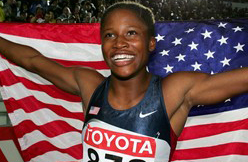For years, there wasn't a major track meet where you didn't see sprinter Lauryn Williams contending for medals. A world champion and Olympic medalist, the 5-foot-3, 127-pound powerhouse shined in the 100-meter dash.
In 2008, though, that all changed. Williams could still run faster than most women on earth, but that untouchable force field that made her one of the most decorated sprinters in U.S. history was deteriorating. While the world watched Williams' and teammate Torri Edward's bungled baton exchange -- and eventual disqualification -- in the 4x100-meter relay finals of the Olympic Games in Beijing, they were watching a star falling from her precipice atop a sport she'd dominated for half a decade.
"My heart wasn't in it anymore," said Williams, 28, noting that along with her faltering dedication to running, she had also been rocked by the death of her father, David, in October, 2008. "I had been competing for seven seasons as a pro and just didn't have the same motivation."
So, after her third-consecutive appearance at the world championships in August, 2009, where she placed fifth in the 100 meters, Williams quietly -- and temporarily -- stepped away from competition. It was time to mourn. To refocus. To refresh.
Instead of retreating to a pity party or escaping into anguish while pressing pause on her career, Williams celebrated her newfound freedom. Living in Miami, the Pittsburgh native found herself thirsting to try all of the things she had to sacrifice as an elite athlete. She took a part-time position at University of Miami, her alma mater, counseling student athletes. She skydived. Skied. Played flag football. Relaxed. Ate anything she wanted to.
"I didn't have a list of things I wanted to do, but if I had the opportunity to try it, I did," she said. "I was up for anything and had a lot of fun."
She also took time to connect with her family, a move she felt was especially important after her father's death following a long battle with Leukemia. "I have three younger sisters and I had the chance to actually spend time with them, instead of just calling home once in a while," Williams said. "I went to their graduations, drove them to college and developed relationships with my extended family."
Meanwhile, track and field continued without Williams. As rivals like fellow American Carmelita Jeter and Jamaican Shelly-Ann Fraser turned in quicker-than-ever performances, she felt the tug of competition pulling her back to the track. So last year, Williams began training in earnest for the 2011 season with her longtime coach, Amy Deem, who also leads the women's track and field program at the University of Miami. Deem infused more power-focused workouts into her training regime, shaking things up by adding hurdle and having her lifting heavier weights. The goal? To increase her explosiveness out of the blocks, then literally muscle her way to the finish line of both sprint events.
"If you stick with the same old thing, you get complacent. So we used different workouts to shock the system," Williams said.
The approach seems to be working. Earlier this year, Williams made a seamless return to the sport, clocking a world-leading 22.65 200-meter at the Hurricane Invitational at the University of Miami. She then went on to win the women's 100 meters at the Kansas Relays in late April. She's racing nearly every weekend within the next two months. The focus of her season is the USA Championships in June in Eugene, Ore., where she will try to qualify for the 2011 world championships, to be held late this summer in South Korea.
And while the sight of her powering her way to the finish line may be a familiar one, Williams says she sees herself as a brand-new athlete.
"I'm much more peaceful now, and wiser," Williams said, adding that qualifying for her third-straight Olympic Games in 2012 is her No. 1 focus. "Taking time off helped me put all of my ducks in a row. I know where I'm going and how I'm going to get there."

(w.espn.com)



